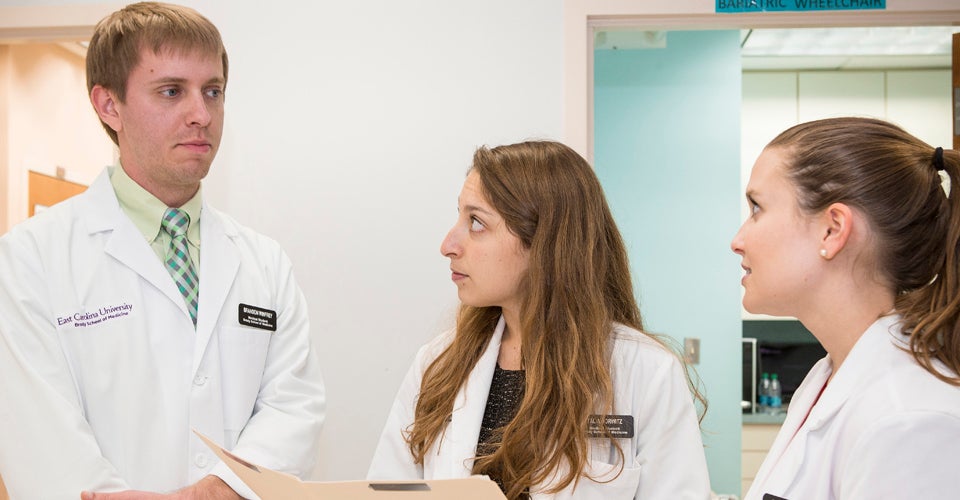CLINICAL CATALYSTS
Grants prepare future providers, enhance care in rural areas
The Department of Family Medicine at East Carolina University has landed several large grants this year aimed at enhancing primary health care in rural areas.
Collectively totaling $4.5 million, the grants were all awarded to the Brody School of Medicine by the Health Resources & Services Administration (HRSA), the primary federal agency for improving health care for people who are geographically isolated or otherwise economically or medically vulnerable.
“HRSA wants to support caring for underserved populations and training providers who will practice in underserved areas,” said Dr. Doyle (Skip) Cummings, director of research for the family medicine department. “They’re a good fit with institutions like ours who aim to teach learners at every level how to work with this population.”
The largest of the three awards – weighing in at $2.5 million over five years – focuses on training future health care professionals across multiple primary care disciplines to deliver the type of primary care that will be increasingly important as our national system moves toward a patient-centered medical home model. It emphasizes high quality, patient-focused, interdisciplinary team-based care.
And the grant goes one more step: it aims to equip ECU’s primary care graduates to lead clinical practices through the transformation process that will be necessary to optimize care outcomes for rural, underserved patient populations.
“At the national level, we now have a clearer understanding of the value of well-designed primary care systems to improve population health,” said Dr. Elizabeth Baxley, Brody’s senior associate dean for academic affairs and the principal investigator on the grant.
“The traditional acute-care model is being replaced by one that sets new priorities around quality of care, patient safety and population health,” Baxley continued. “And the vast majority of current providers have limited training and skills in evaluating data around those measures and leading efforts to change their practices accordingly.”
The grant will fund the restructuring of portions of existing curricula for medical, nurse practitioner, physician assistant and clinical psychology students to help them develop the skills necessary to deliver data-driven, collaborative care in practices that are part of a transformed rural health care delivery system.

Community physician Jessica Triche precepts Brody students in her Chocowinity practice.
Brody’s third-year medical students currently spend half of their eight-week family medicine clerkships with community physicians across the state. The new grant will enable Brody to add more preceptor sites for students – some where providers would like to learn more about transforming their practices into patient-centered medical homes, and others where providers are already incorporating these changes into their practices.
“Federally Qualified Health Centers like Greene County Health Care, Kinston Community Health Center, Goshen Medical Center in Duplin County – they’ve been required to report quality metrics for a long time now, so we can learn from them,” said Cummings.
Federally Qualified Health Centers (FQHCs) are community-based organizations that provide comprehensive primary care and preventive care to persons of all ages, regardless of their ability to pay or their health insurance status.
“We want our graduates to be catalysts for positive changes that will help meet the needs of at-risk patients and improve health outcomes in North Carolina,” Baxley said.
Cummings is also overseeing a second HRSA grant of $1.2 million that will enable the Department of Family Medicine to increase access to primary health care in rural Duplin County.
Building on the department’s existing telemedicine program and its long-standing relationship with Goshen Medical Center, the largest FQHC in North Carolina, this grant will fund the establishment of telehealth connections in three Duplin County schools. Through these links, teachers, staff and students will be able to consult with physicians at Goshen Medical Center and the Department of Family Medicine.
A third HRSA grant of approximately $800,000 is a cross-campus collaboration aimed at attracting more doctoral students in clinical psychology. The principal investigators are Dr. Dennis Russo, section head for behavioral health in family medicine, and Dr. Robert Carels, director of clinical training for the Department of Psychology.
“These grants provide critical infrastructure support that helps us take additional important steps toward Brody becoming a national model for rural health care,” Baxley said.
